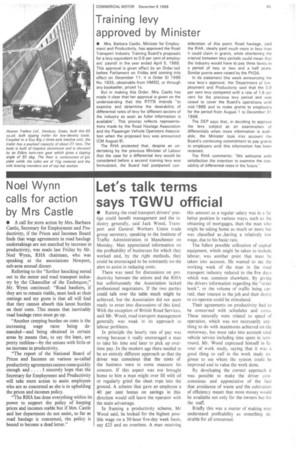Let's talk terms says TGWU official
Page 47

If you've noticed an error in this article please click here to report it so we can fix it.
• Raising the road transport drivers' prestige could benefit management and the industry generally, said Jack Wood, Transport and General Workers Union trade group secretary, speaking to the Institute of Traffic Administration in Manchester on Monday. Men appreciated information on the profitability of businesses for which they worked and, by the right methods, they could be encouraged to be constantly on the alert to assist in reducing costs.
There was need for discussions on productivity between the unions and the RHA but unfortunately the Association lacked professional negotiators. If the two parties could talk over the table much might be achieved, but the Association did not seem ready to enter into discussions of this kind. With the exception of British Road Services, said Mr. Wood, road transport management generally was weak in its approach to labour problems.
In principle the hourly rate of pay was wrong because it really encouraged a man to take his time and later to pick up overtime pay. In the modern age there needed to be an entirely different approach so that the driver was conscious that the costs of the business were in some measure his concern. If this aspect was not brought home to him a man might over fill with oil or regularly grind the sheet rope into the ground. A scheme that gave an employee a 40 per cent bonus on savings in this direction would still leave the operator with the main advantage.
In framing a productivity scheme, Mr Wood said, he looked for the highest possible wage on a 50-hour five-day week basis, say £25 and no overtime. A man receiving
this amount as a regular salary was in a far better position in various ways, such as the obtaining of mortgages, than the man who might be taking home as much or more but was classified as ,..having a relatively low wage, due to his basic rate.
The fullest possible utilization of capital equipment, which might be taken to include labour, was another point that must be taken into account. He wanted to see the working week of the Man in the road transport industry reduced to the five days which was common elsewhere. By giving the drivers information regarding the "order book", or the volume of traffic being carried, their interest in the job and their desire to co-operate could be stimulated.
Their agreements on productivity had to be concerned with schedules and costs. These naturally were related to speed of operation, which was not necessarily anything to do with maximums achieved on the motorway, but must take into account total vehicle service including time spent in turnround. Mr. Wood expressed himself in favour of work study, saying that it was a good thing to call in the work study engineer to see where the system could be improved and to value the work done.
By developing the correct approach it was possible to make the driver cost conscious and appreciative of the fact that avoidance of waste and the cultivation of efficiency meant that more money would be available not only for the owners but for the staff.
Briefly this was a matter of making men understand profitability as something desirable for all concerned.








































































































































































